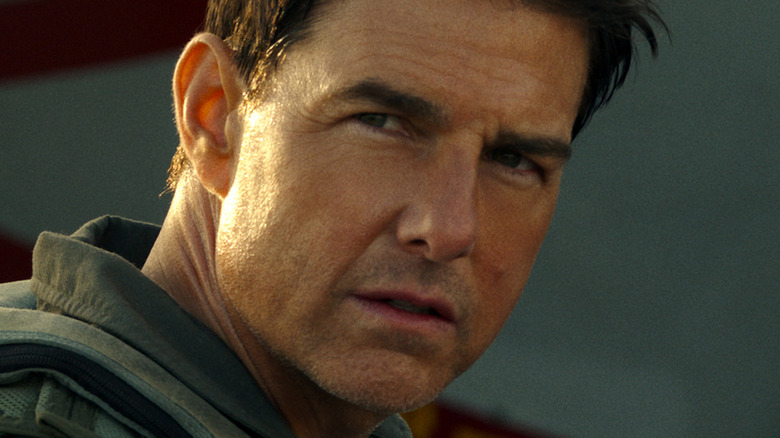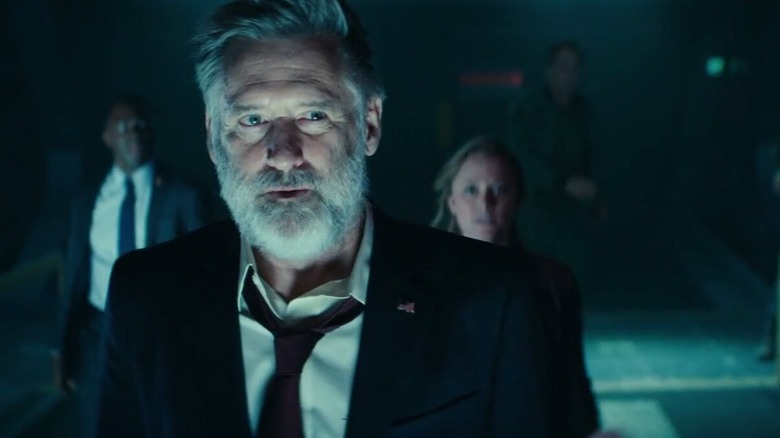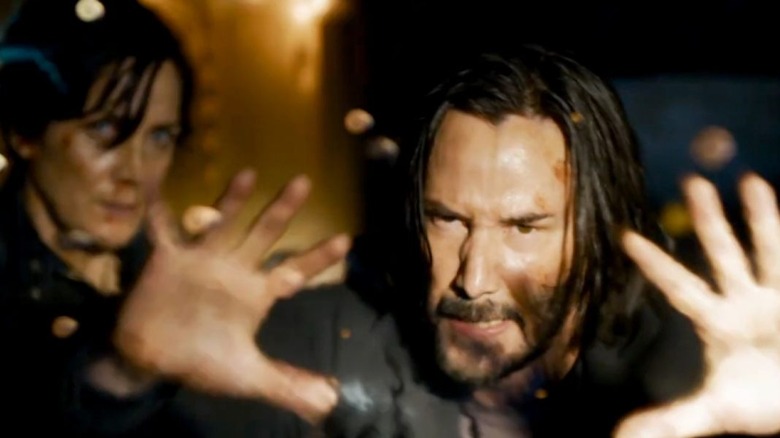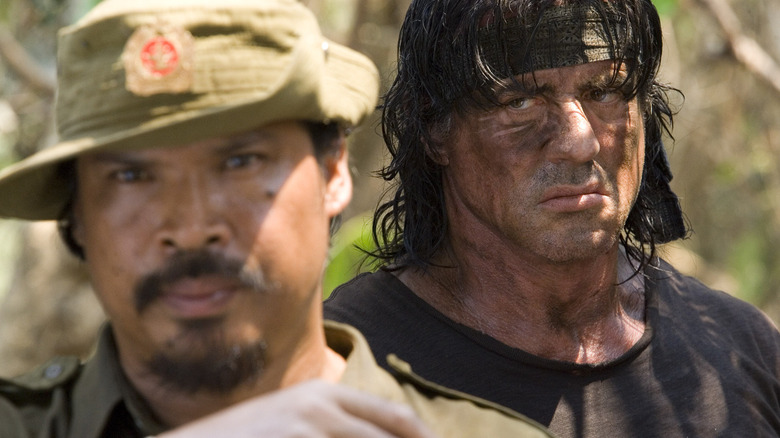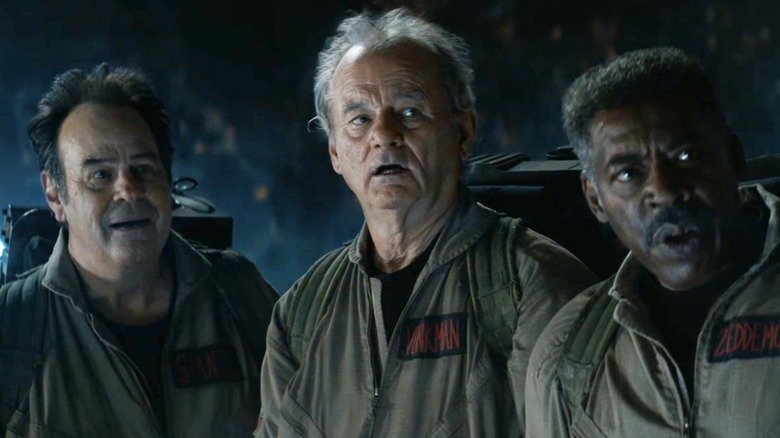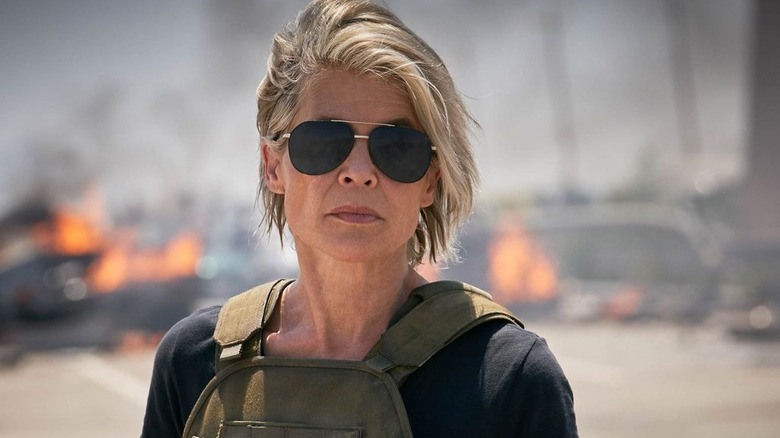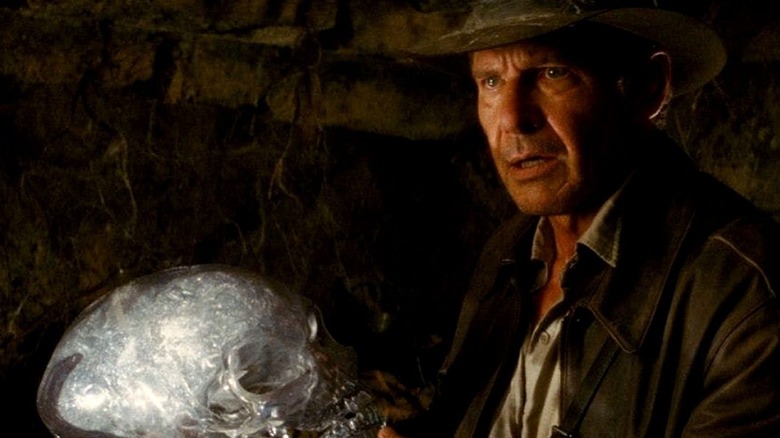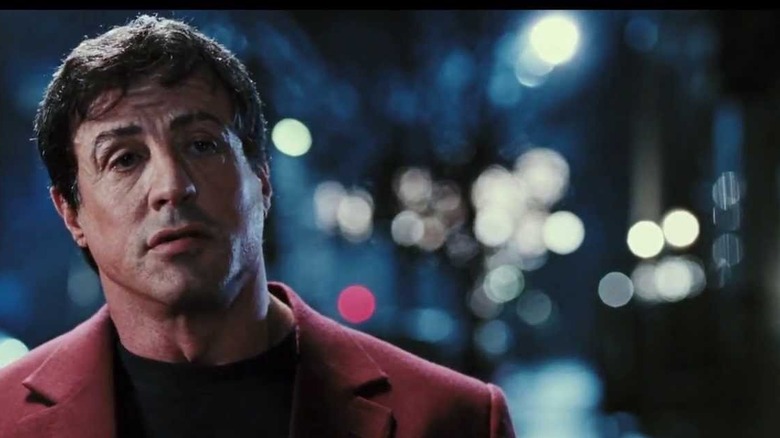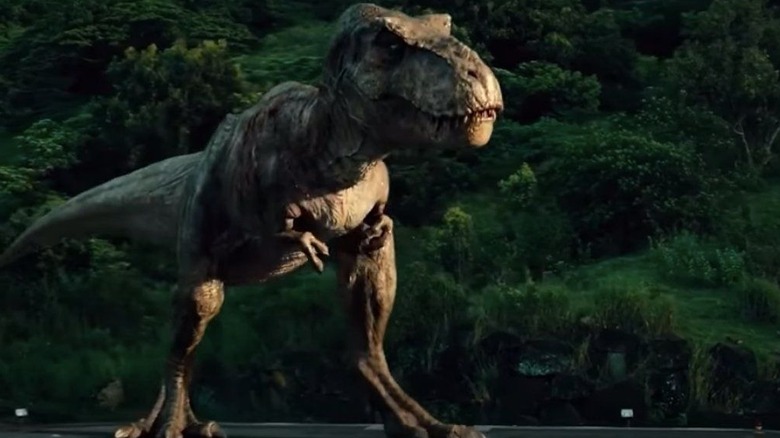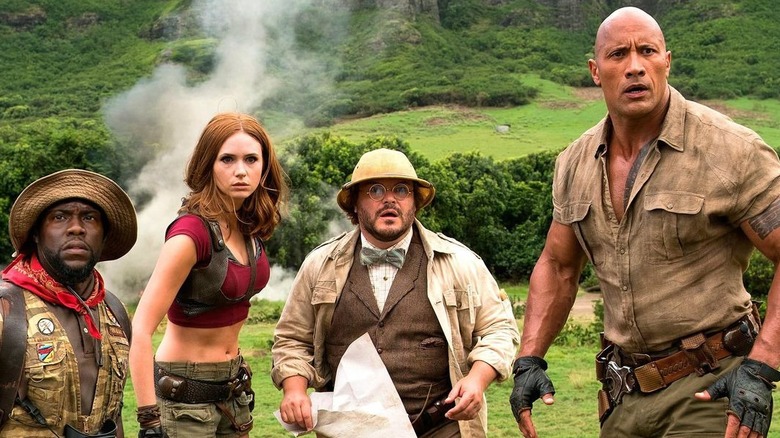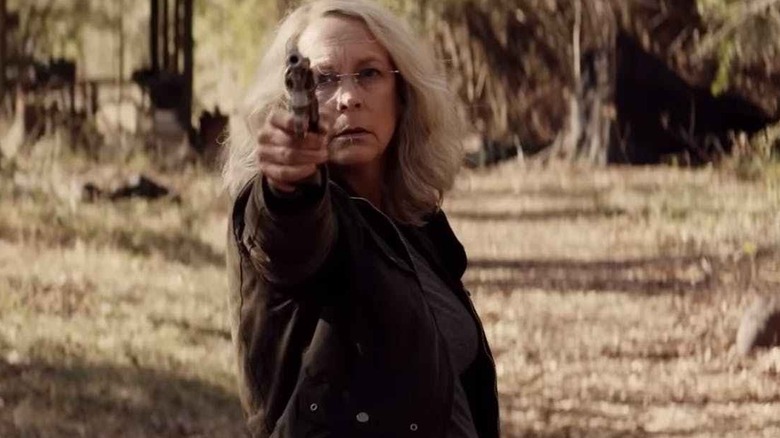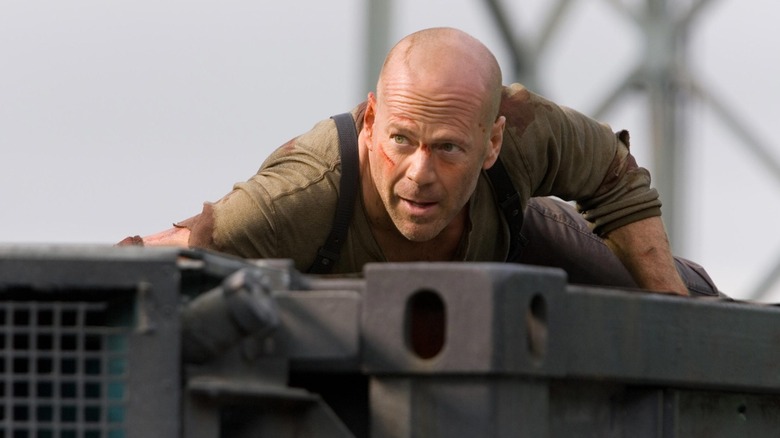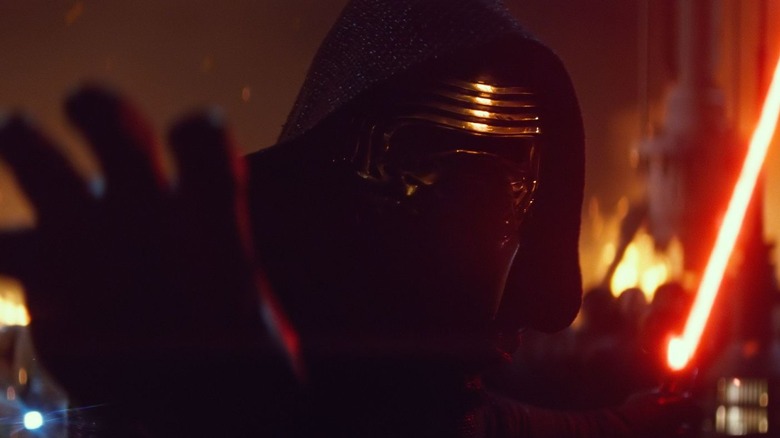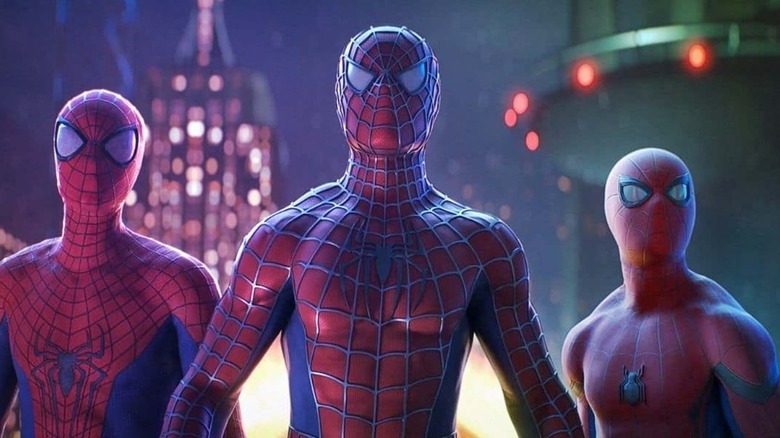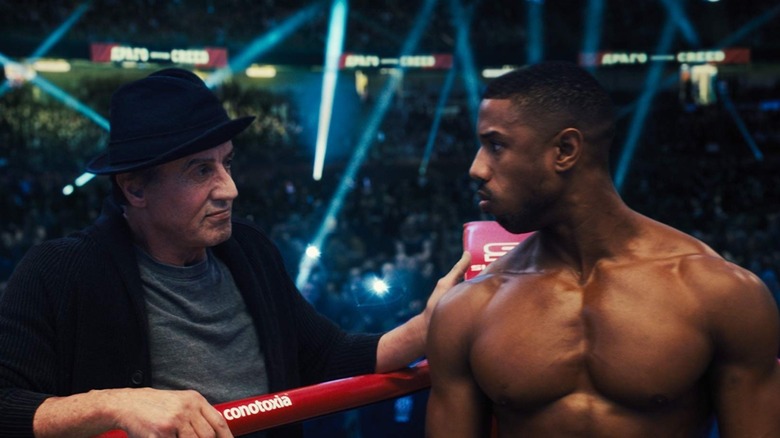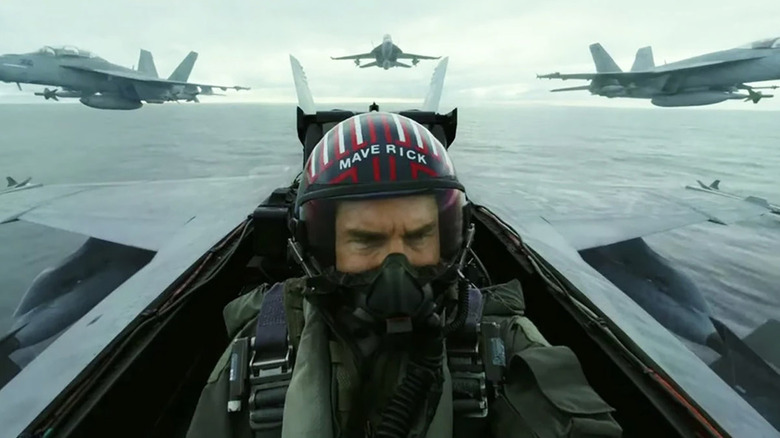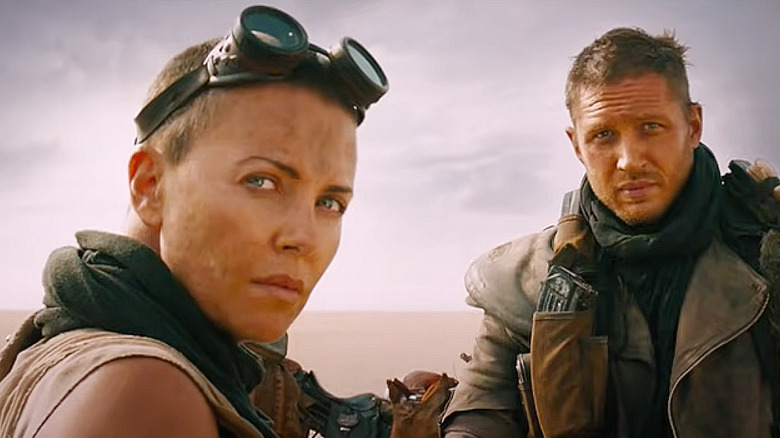The Most Memorable Legacy Sequels Ranked From Worst To Best
Legacy sequels may signal the death of creativity in Hollywood, but dang it, they sure are fun! Nothing tastes sweeter than the nectar of nostalgia, especially when served up with equal helpings of new thrills and shameless fan service. Legacy sequels are big business because they make money and revive proven, long-dormant franchises, beckoning them back to their multi-billion-dollar blockbuster glory days.
However, just because legacy sequels tend to be cynical cash grabs doesn't mean they're bad. Yes, some are truly terrible, but others provide a fresh vision to fan-favorite franchises. We're defining "legacy sequel" as any franchise follow-up that takes place more than 10 years after the previous entry (the ideal time between sequels was said at one point to be two to four years). Which sequels honor their franchise's "legacy" — and which should never have been made in the first place? Some are good, some are bad, but all are memorable — here are legacy sequels ranked from worst to best.
16. Independence Day: Resurgence
The worst movie on our list should be no surprise: "Independence Day: Resurgence." Film critics and moviegoers saw eye-to-eye on this intergalactic train wreck, released 20 years after "Independence Day" dominated the summer of 1996. The Numbers shows us that "Independence Day" earned $817 million worldwide and $384 million domestically, while "Independence Day: Resurgence" made only a little bit more worldwide (and sold way less tickets) than "ID4" did at the domestic market alone.
What happened? First, it was bad. However, its $41 million opening weekend (less than the $50 million that "ID4" earned) showed that fans weren't feeling it. Will Smith saying "Hell naw" definitely played a huge part in its failure. But the biggest issue was lack of fan demand. "ID4" was a summer blockbuster that didn't warrant a sequel, as the story was told, the aliens were dead, and everyone lived happily ever after. Moviegoers are savvy and realized the aliens returned in "Resurgence" for one reason only; to make money. Alas, that didn't happen.
15. The Matrix Resurrections
"The Matrix Resurrections" is either brilliant or the worst, depending on your point of view. It's a legacy sequel that criticizes the very idea of legacy sequels, which is clever, but also quite the flex for a movie that needed to make a lot of money by catering to the same nostalgia-driven pop culture it was criticizing. It's clear watching this movie that Lana Wachowski had no desire to make it, but only did so because she knew that a legacy sequel was inevitable and didn't want somebody else screwing it up. Turns out that was unnecessary, as she screwed it up just fine.
The Rotten Tomatoes scores from critics and moviegoers are so-so, not spectacular, but the film's $156 million worldwide gross was a straight-up disaster. You can blame Warner Brothers for releasing the movie on HBO Max at the same time, but they did that with their entire 2021 slate, including successes like "Godzilla vs. Kong" and "Dune." No, moviegoers just had no desire to re-enter The Matrix.
14. Rambo
"Rambo" was released in 2008, 20 years after "Rambo III" sent the series into seclusion. While it has some of the lowest critic's scores on our list, moviegoers dug it. Besides, let's be honest, the "Rambo" series hasn't been made for critical approval since "First Blood."
After the blockbuster sequel, "Rambo: First Blood Part II," slayed at the 1985 box office, the series was transformed. It went from a thoughtful meditation on PTSD and a country's responsibility to those who fought and died for it into the ultimate one-man-army, shoot 'em up, "Dad movie" you watch on a Saturday afternoon on TBS, with Rambo piling up bodies as high as the series piled up dollars.
Based on the dichotomy between critics' low ratings and fans' high ratings, it appears moviegoers are totally into it. This trend continued with 2019's "Rambo: Last Blood," which came out 11 years after "Rambo." It managed the worst critical reviews of the franchise ... but some of the best audience scores.
13. Ghostbusters: Afterlife
The "Ghosbusters" franchise has had an interesting post-mortem ever since 1989's "Ghostbusters II," which broke the opening weekend box office record (until "Batman" broke it a few weeks later), but whose mediocrity broke moviegoers' hearts. The series stayed in the Containment Unit for 27 years, with "Ghostbusters 3" ideas bouncing around development hell, until an ill-conceived reboot-remake-remix arrived in 2016. "Ghostbusters: Answer The Call" was ... okay, but also not worth the nearly three-decade wait.
Columbia Pictures tried again with 2021's "Ghostbusters: Afterlife," this time with the same cast in the same universe, 32 years after "Ghostbusters 2." The results were ... also okay. Critics liked it a little bit less than the 2016 reboot, while moviegoers liked it a lot more. Either way, the "Ghostbusters" series hasn't come close to matching the success of the 1984 original, suggesting that this series never warranted the franchise treatment. If you want a successful, multi-film franchise, who ya gonna call? Not "Ghostbusters."
12. Terminator: Dark Fate
Yes, technically, "Terminator: Dark Fate" came out only four years after 2015's "Terminator: Genisys." However, 2019's "Dark Fate"' was not a sequel to "Genisys" (stay with us here). It was technically a direct follow-up to the 1991 sequel, "Terminator 2: Judgment Day," erasing the three movies and one TV series that came in between. Given that it picks up a storyline from 28 years earlier (though we're not sure most moviegoers knew that going in), and brought back Linda Hamilton's Sarah Connor, "Dark Fate" belongs on our list.
While "Dark Fate" was the most lauded movie in the franchise since "Judgment Day," it wasn't good enough to undo the damage that had already been done during the three decades of mediocrity. You can go back in time to kill John Connor, but you can't terminate moviegoers' memories. With the lowest grosses of the series (adjusted for inflation), "Dark Fate" met a, well, dark fate, terminating the franchise for the foreseeable future. For how long? No telling. But to paraphrase Arnold Schwarzenegger: "It'll be baaack."
11. Indiana Jones and the Kingdom of the Crystal Skull
Has a movie's legacy ever been more at odds with its Rotten Tomatoes score than "Indiana Jones and the Kingdom of the Crystal Skull?" We think not. The fourth film in the franchise starring the globetrotting adventurer got strong reviews and finished 2008 second only to "The Dark Knight" at the worldwide box office. However, we suspect that success was due to the goodwill the Indiana Jones series had built with the original trilogy. People were so excited to see Dr. Jones again that they ignored the fact that "Crystal Skull" was kind of mediocre.
The lackluster audience score gives a better indication on the movie's quality (or lack thereof), as well as its legacy in fans' minds. Basically, "Crystal Skull" turned a fairly grounded franchise with supernatural overtones into a CGI-fest that looked more like a "Mummy" movie than an "Indiana Jones" one. Also, Indiana Jones survived a nuclear explosion by climbing in a fridge. That happened. Anyway, while some argue that "Crystal Skull" deserves a reappraisal, it certainly doesn't deserve a higher spot on our list.
10. Rocky Balboa
"Rocky" creator and star Sylvester Stallone was disappointed with the series' original conclusion, "Rocky V," even going so far as to tell Collider that he'd like to "re-edit" the 1990 movie, which he didn't even direct (it was helmed by original "Rocky" director John G. Avildsen). Stallone wanted to give "The Italian Stallion" a proper send-off. He got his chance 16 years later with "Rocky Balboa," the sixth film in the franchise.
Stallone would not only write and star in the film, but direct it (his fourth "Rocky" film as a director), giving him full responsibility for the film's success ... or failure. For fans of the franchise, "Rocky Balboa" was worth the wait. The 2006 film earned strong reviews from critics and fans, including some of the best reviews in the series since the 1976 original. Stallone's personal send-off to "The Italian Stallion" was a critical and commercial success, earning $156 million worldwide according to The Numbers, but he'd be back soon in 2015's "Creed."
9. Jurassic World
Following the critical failure of "Jurassic Park III" in 2001, and the steep commercial decline of the series as a whole, it seemed like the "Jurassic" franchise was extinct. Turns out, it was only dormant. Behind the scenes, Universal Studios had been busy considering lots of "Jurassic Park IV" ideas, including one about human-dino hybrids. Thankfully, that never happened, as the filmmakers instead went back to the drawing board and simplified the series with an irresistible pitch: "The Park Is Open."
Naturally, being a "Jurassic" movie, something goes wrong, but "The Park Is Open" concept was such a shockingly brilliant idea that we're stunned it took them 14 years to think of it. We're also astounded that "Jurassic World" broke the opening weekend box office set three years earlier by "The Avengers," conquered that film's sequel, "Avengers: Age of Ultron," at the summer 2015 box office, and turned out to be a pretty good movie too, with the best reviews from critics and fans since the 1993 original.
8. Jumanji: Welcome to the Jungle
Franchise filmmaking is complicated. Besides "legacy sequels," there are also "vague sequels," movies which kind of take place in the same universe, but otherwise make little to no reference to previous entries — arguably like "Jumanji: Welcome to the Jungle." But since the franchise has definitively established itself as taking place in the same universe as the 1995 Joe Johnston-directed original, we're classifying "Welcome to the Jungle" as a legacy sequel.
And what a legacy it creates on its own, reviving the franchise and transforming it from its action-adventure roots (despite starring comedy legend Robin Williams) into an action-comedy hybrid as funny as it is exciting. Released 22 years after "Jumanji," and 12 years after the disastrous spin-off, "Zathura," the 2017 film trades a board game for a video game and goes from a Williams star vehicle into an ensemble. Based on its strong reviews, the best in the series (turns out critics didn't like the original), both moviegoers and critics were excited to be welcomed to the "Jungle."
7. Halloween
The "Halloween" franchise has come back from the dead more times than Michael Myers himself. It's kind of confusing how the franchise plays out, so we won't attempt to explain it. However, we know for certain that the Blumhouse-produced "Halloween" is a direct sequel to the 1978 original, slashing away the nine movies (and multiple separate franchises and spin-offs) that took place in the preceding 40 years.
Directed by indie darling, mainstream comedy director, and mega "Halloween" fanboy David Gordon Green, "Halloween" finds Michael Myers escaping from the insane asylum to once again wreak havoc on unsuspecting Haddonfield, Illinois on Halloween night. Turns out Jamie Lee Curtis' Laurie Strode (who is now no longer Michael Myers' little sister, as established in "Halloween II") has been waiting for him, with a personal cache of weapons and booby traps that would impress even Sarah Connor. "Halloween" certainly impressed critics and fans, with the second-best reviews in the series after the original horror masterpiece.
6. Live Free or Die Hard
John McClane may be the most unlucky (and unlikely) character in movie history. Sure, James Bond and Ethan Hunt go on crazy adventures too, but they're super-spies. McClane is just your run-of-the-mill cop who keeps on finding himself trapped in the middle of terrorist attacks. Point being, the basic premise of the "Die Hard" series stretches credulity, which is saying something for an action movie. So it's amazing that "Die Hard" has consistently delivered, with only one outright dud, the 2013 franchise-killer "A Good Day To Die Hard."
The second-best of the series was the fourth film, 2007's "Live Free or Die Hard," released 18 years after the first film and 12 years after "Die Hard with A Vengeance." The film is about ... well, you know what it's about. McClane shows up in a big city where a terrorist launches an attack, forcing the New York cop to save the country. As the critics' consensus puts it: "'Live Free or Die Hard' may be preposterous, but it's an efficient, action-packed summer popcorn flick with thrilling stunts and a commanding performance by Bruce Willis." Put simply, watching this movie will leave you screaming "yippee ki yay..." — you know the rest.
5. Star Wars: The Force Awakens
"Star Wars: The Force Awakens" certainly had its work cut out for it. It was the first live-action "Star Wars" movie in 10 years, following the divisive prequel trilogy, which despite banking billions had as many detractors as fans. More significantly, it was the first "Star Wars" sequel in 32 years, advancing the saga for the first time since 1983's "Star Wars: Episode VI — Return of the Jedi." So "The Force Awakens" not only had to wash the stank of the prequels out of people's minds, it had to follow one of the most beloved trilogies of all time. No pressure.
Did it succeed? Depends who you ask. While fans complained at the time that "The Force Awakens" was highly derivative of "A New Hope" (to the point of being a borderline remake), it did earn rave reviews across the board — and became the highest-grossing domestic release ever. We can debate the movie's quality (or the quality of the sequel trilogy in general), but there's no denying that in 2015 "The Force Awakens" accomplished its mission: to awaken the fans' passion again.
4. Spider-Man: No Way Home
So is "Spider-Man: No Way Home" a legacy sequel or a regular sequel? The answer to both is "yes." While "No Way Home" is the third film in the MCU "Spider-Man" series starring Tom Holland, it is also the third film in the Andrew Garfield "Amazing Spider-Man" series and the fourth film in the Tobey Maguire "Spider-Man" run. "No Way Home" came out seven years after "The Amazing Spider-Man 2" and 14 years after "Spider-Man 3" (yes, there have been eight live-action "Spider-Man" movies in less than 20 years), so it qualifies as a legacy sequel.
"No Way Home" also qualifies as one of the best legacy sequels, period, with glowing reviews from critics and fans, making it one of the best "Spider-Man" movies as well. Stephen D. Greydanus of the "Catholic World Reporter" put it best when he said "No Way Home" was "crossover comfort food with a redemptive twist." What makes "No Way Home" such a great legacy sequel is that it doesn't just honor one live-action "Spider-Man" franchise, but all of them.
3. Creed
Sylvester Stallone probably thought he was hanging up his gloves for the last time in 2006's "Rocky Balboa." Filmmaker Ryan Coogler had other ideas, bringing "The Italian Stallion" back for the seventh film in the "Rocky" franchise and the first in the "Creed" series. Part spin-off, part legacy sequel, "Creed" finds the son (Michael B. Jordan) of Rocky's greatest rival and best friend, the late Apollo Creed, seeking out the former world champion to train him.
Technically, "Creed" only came out nine years after "Rocky Balboa," but we're including it because it hits all of the other tropes of a legacy sequel; it takes place nearly a decade later, includes old characters interacting with new ones, and features a passing of the torch motif. Also, it's really, really good. In fact, "Creed" is Stallone's second-best movie behind only "Rocky," and Jordan's second best, behind only "Black Panther" (though its audience score is higher). Thanks to those numbers, the "Rocky" legacy lives on in "Creed."
2. Top Gun: Maverick
Gen-Xers around the world rejoiced when the trailer for "Top Gun: Maverick" dropped ... but then "Top Gun: Maverick" got delayed. And delayed. And delayed. Now two years after "Top Gun: Maverick" was first supposed to debut in 2020, and 36 years after the original film in 1986, is "Top Gun: Maverick" worth the hype? Oh yes. "Top Gun: Maverick" could have been another shameless cash grab meant to capitalize on nostalgia for a beloved classic. Instead it's pretty much a perfect summer blockbuster that far surpasses the original (to be fair, critics never liked "Top Gun" — it was the fans that made it a smash).
While "Top Gun" is an '80s time capsule, "Top Gun: Maverick" is timeless, a good old-fashioned reminder of what action movies looked like when movie stars were the superheroes. As Emmanuel Noisette of "The Movie Blog" put it: "'Top Gun: Maverick' is the total package of what a blockbuster movie should be." With the biggest opening weekend of Tom Cruise's career (and one of the biggest openings for a star vehicle, period), "Top Gun: Maverick" soars as one of the best legacy sequels ever.
1. Mad Max: Fury Road
Audiences didn't clamor for a new "Mad Max" movie the way they were demanding a new "Indiana Jones" or "Star Wars" film. Yes, the original series has quite the cult following, with "Mad Max 2: The Road Warrior" being a genuine action movie classic. But series creator George Miller wasn't to be denied, keeping his dreams of a fourth "Mad Max" alive despite decades in development hell. When the fourth "Mad Max" finally hit screens 30 years later, Mel Gibson was out and Tom Hardy was in as the titular Max Rockatansky, with Charlize Theron joining the fray as Imperator Furiosa.
While the world wasn't asking for a new "Mad Max," they weren't prepared for the off-the-wall, non-stop action movie masterpiece that is "Mad Max: Fury Road." The 2015 sequel earned incredible reviews, strong box office (especially for a legacy sequel to a cult series), and unlike any other movie on our list (so far), an Academy Award nomination for Best Picture, with six wins out of 10 nominations. There are plenty of great legacy sequels, but for right now at least, "Mad Max: Fury Road" leaves them in the dust.
